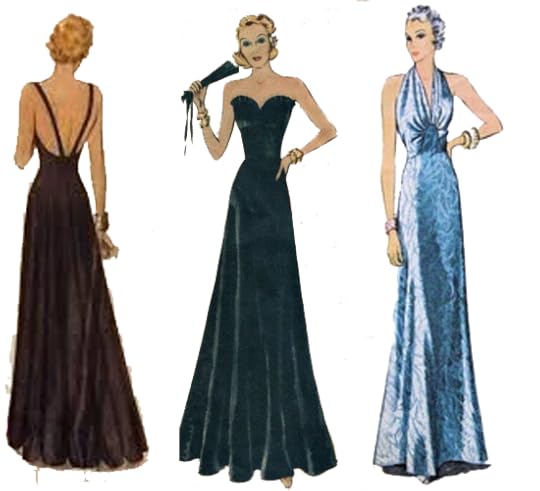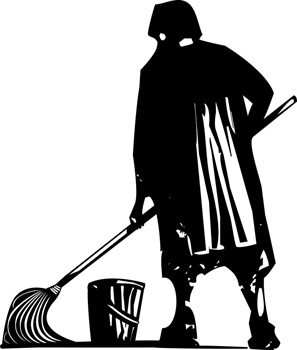Faith A. Colburn's Blog, page 6
June 9, 2017
Bobbi’s Fashion
When Bobbi Bowen, a consummate tomboy, decides to enter a singing contest–with a lot of encouragement from her friends–she has to think about costuming. In the depths of the 1930s she had no money to buy anything new. But money isn’t her biggest concern.
Here she is, talking to her friends as she continues to resist the contest idea.
“But, I’d have to get all dressed up and wear high heels and . . . stuff.”
Kate cocked her head. “Stuff? What kinda stuff?”
“You know.” I paused looking for a word. I didn’t want to embarrass myself. “Underneath.”
Kate laughed. “Like a girdle?”
I could feel my face heat up. I couldn’t help it. “Yeah.”
“So? What’s wrong with that?”
I leaned over to the girls, shielding my mouth with my hand. “They’re hot and rubbery and itchy.”
The boys snickered.
“It’s not funny.”
Helen’s voice came from under the arm she had slung over her eyes. “Maybe not, but what’re you gonna do?”
As it turned out, Bobbi got lucky. She could wear street clothes for the contest. But when she made her voice her profession, her luck ran out. Fortunately, her mother had some gowns left over from before the world economy took its monstrous nose dive. Pictured below are a few gowns that she might have chosen to wear when she graduated to singing in nightclubs. And yes, she did wear the dreaded corselet—as much to defend against pinching fingers as to enhance her appearance.
 These evening gowns, taken from the covers of McCalls pattern envelopes. would have been high fashion in the 1930s and early 1940s.
These evening gowns, taken from the covers of McCalls pattern envelopes. would have been high fashion in the 1930s and early 1940s.®All images courtesy of the McCall Pattern Co., Inc. copyright @2017
Bobbi’s Fashion
When Bobbi Bowen, a consummate tomboy, decides to enter a singing contest–with a lot of encouragement from her friends–she has to think about costuming. In the depths of the 1930s she had no money to buy anything new. But money isn’t her biggest concern.
Here she is, talking to her friends as she continues to resist the contest idea.
“But, I’d have to get all dressed up and wear high heels and . . . stuff.”
Kate cocked her head. “Stuff? What kinda stuff?”
“You know.” I paused looking for a word. I didn’t want to embarrass myself. “Underneath.”
Kate laughed. “Like a girdle?”
I could feel my face heat up. I couldn’t help it. “Yeah.”
“So? What’s wrong with that?”
I leaned over to the girls, shielding my mouth with my hand. “They’re hot and rubbery and itchy.”
The boys snickered.
“It’s not funny.”
Helen’s voice came from under the arm she had slung over her eyes. “Maybe not, but what’re you gonna do?”
As it turned out, Bobbi got lucky. She could wear street clothes for the contest. But when she made her voice her profession, her luck ran out. Fortunately, her mother had some gowns left over from before the world economy took its monstrous nose dive. Pictured below are a few gowns that she might have chosen to wear when she graduated to singing in nightclubs. And yes, she did wear the dreaded corselet—as much to defend against pinching fingers as to enhance her appearance.
 These evening gowns, taken from the covers of McCalls pattern envelopes. would have been high fashion in the 1930s and early 1940s.
These evening gowns, taken from the covers of McCalls pattern envelopes. would have been high fashion in the 1930s and early 1940s.®All images courtesy of the McCall Pattern Co., Inc. copyright @2017
June 1, 2017
Bobbi’s Mom–It’s a Hard Life
 Bobbi’s mom pays the rent scrubbing floors in a bank. At least half of that job is hands-and-knees and elbow grease.
Bobbi’s mom pays the rent scrubbing floors in a bank. At least half of that job is hands-and-knees and elbow grease.Bobbi’s mother, Ella O’Brien, at 35, has always worked hard. As first-born daughter, she had increasing charge of her parents’ brood, ending with ten. As her mother’s mental health deteriorated, Ella became the family’s unofficial mother until her own mother went completely off the rails and ended up raging in an institution. Their dad farmed all the children out with different relatives at that point—Ella at 16 with a friend’s family.
Starved for attention, Irish Catholic Ella falls for a charming Welch Protestant only to have her father disown her when she goes ahead and marries Paul Bowen. She becomes a skilled waitress in the up-scale restaurant her husband manages, eventually transforming to the position of maître d’. The chaos of her home environment provided her little example of an enduring relationship and her marriage becomes a very on and off affair. When she can afford to live on her own, she does and when things get tough, she reconciles herself to living with her husband.
By the beginning of the novel in 1937, the U.S. economy is about to fall into the second dip of a double-dip depression. She’s living with Paul and Bobbi in a run-down apartment. Among the three of them, they’re trying to keep food on the table and a roof over their heads. She’s bitter that there’s no savings—because Paul gambled all their surplus funds away during the good times.
Her black hair arranges itself in tight curls and she keeps it cropped so she doesn’t have to waste time taking care of it. She’s always pushing a stray lock behind her ear. At 5’4” she’s slightly shorter than her daughter—partly because of the heavy work she’s been doing as a scrubwoman for the past few years since Mowrey’s closed. Ella needs glasses, but there’s no money to buy them, so she squints a lot. One of her favorite sayings is, “If wishes were horses, beggars would ride.” Her grey eyes harden like steel when she’s upset and that’s most of the time. She usually feels marginally ill. She has a very sharp tongue and she does not hesitate to use it, but she keeps on doggedly doing whatever needs doing to keep her family alive.
Ella is smart enough, but she only got to finish fifth grade because her family needed her at home. If she allowed herself to think about it, she would realize she’s nervous, worried and upset all the time. Always has been. She sees herself pretty much as she is—long-suffering. In the short term, all she hopes for is survival, but she hopes someday to become financially independent. She thinks everyone around her sees her as a work horse, worthy of attention only for the work she can do and the money she earns. She is ruled by fear and anger. Her idea of Hell is just what she’s experiencing—an incredibly impractical person is put in charge of all the family’s major life decisions and she has to do whatever he says. She can be very judgmental—especially as a knee-jerk reaction to anything unexpected.
Ella is an extreme introvert, although with her family she expresses her anger in punishing remarks she regrets later. She slogs through sorrow. She yells and throws things when she feels overwhelmed. She hates change and always expects the worst. She’s rarely disappointed. Ella desperately wants someone to take care of her—or at least to notice her. She wishes her husband would develop some common sense about money. She would be thrilled if she could have enough money in the bank to live comfortably.
She tries to cling to her Catholic belief as an antidote to her frightening life, but it doesn’t work very well. She has to work on Sundays, so she rarely enters a church—although she went regularly before poverty gave her little choice.
Bobbi’s Mom–It’s a Hard Life
 Bobbi’s mom pays the rent scrubbing floors in a bank. At least half of that job is hands-and-knees and elbow grease.
Bobbi’s mom pays the rent scrubbing floors in a bank. At least half of that job is hands-and-knees and elbow grease.Bobbi’s mother, Ella O’Brien, at 35, has always worked hard. As first-born daughter, she had increasing charge of her parents’ brood, ending with ten. As her mother’s mental health deteriorated, Ella became the family’s unofficial mother until her own mother went completely off the rails and ended up raging in an institution. Their dad farmed all the children out with different relatives at that point—Ella at 16 with a friend’s family.
Starved for attention, Irish Catholic Ella falls for a charming Welch Protestant only to have her father disown her when she goes ahead and marries Paul Bowen. She becomes a skilled waitress in the up-scale restaurant her husband manages, eventually transforming to the position of maître d’. The chaos of her home environment provided her little example of an enduring relationship and her marriage becomes a very on and off affair. When she can afford to live on her own, she does and when things get tough, she reconciles herself to living with her husband.
By the beginning of the novel in 1937, the U.S. economy is about to fall into the second dip of a double-dip depression. She’s living with Paul and Bobbi in a run-down apartment. Among the three of them, they’re trying to keep food on the table and a roof over their heads. She’s bitter that there’s no savings—because Paul gambled all their surplus funds away during the good times.
Her black hair arranges itself in tight curls and she keeps it cropped so she doesn’t have to waste time taking care of it. She’s always pushing a stray lock behind her ear. At 5’4” she’s slightly shorter than her daughter—partly because of the heavy work she’s been doing as a scrubwoman for the past few years since Mowrey’s closed. Ella needs glasses, but there’s no money to buy them, so she squints a lot. One of her favorite sayings is, “If wishes were horses, beggars would ride.” Her grey eyes harden like steel when she’s upset and that’s most of the time. She usually feels marginally ill. She has a very sharp tongue and she does not hesitate to use it, but she keeps on doggedly doing whatever needs doing to keep her family alive.
Ella is smart enough, but she only got to finish fifth grade because her family needed her at home. If she allowed herself to think about it, she would realize she’s nervous, worried and upset all the time. Always has been. She sees herself pretty much as she is—long-suffering. In the short term, all she hopes for is survival, but she hopes someday to become financially independent. She thinks everyone around her sees her as a work horse, worthy of attention only for the work she can do and the money she earns. She is ruled by fear and anger. Her idea of Hell is just what she’s experiencing—an incredibly impractical person is put in charge of all the family’s major life decisions and she has to do whatever he says. She can be very judgmental—especially as a knee-jerk reaction to anything unexpected.
Ella is an extreme introvert, although with her family she expresses her anger in punishing remarks she regrets later. She slogs through sorrow. She yells and throws things when she feels overwhelmed. She hates change and always expects the worst. She’s rarely disappointed. Ella desperately wants someone to take care of her—or at least to notice her. She wishes her husband would develop some common sense about money. She would be thrilled if she could have enough money in the bank to live comfortably.
She tries to cling to her Catholic belief as an antidote to her frightening life, but it doesn’t work very well. She has to work on Sundays, so she rarely enters a church—although she went regularly before poverty gave her little choice.
May 26, 2017
15 Gangster Words and Phrases You’re Sure to Love
Since the mob was active in Cleveland, as in many big cities during prohibition, gangsters figure in Bobbi’s story as well. I researched a little 1930s gangster slang for my mob characters. Here are 15 words and phrases that may appear in The Reluctant Canary Sings.
 In gangster slang, this is a “Typewriter”
In gangster slang, this is a “Typewriter”Typewriter—machine gun
Silk Hat—publicly respected member of the mob.
Wrong Gee—wrong person.
Frail—girl
Bull—cop
Heeled—armed (with a firearm)
Ghive—stiletto.
 In gangster slang, this is called a “Ghive”
In gangster slang, this is called a “Ghive”
Apron—bartender
Bazoo—easy mark
Big Boy—federal judge
Dance Hall—death row
House Work—Burglary
Porch Cover—fancy necktie
Tops—loaded dice
Round the Horn—Taking a prisoner from police station to police station to avoid him getting a habeas corpus until some information can be obtained from him. These dice are loaded. Notice the snake eyes coming up. Gangsters called these “Tops.”
These dice are loaded. Notice the snake eyes coming up. Gangsters called these “Tops.”
For more gangster talk go to the Al Capone Museum Website.
15 Gangster Words and Phrases You’re Sure to Love
Since the mob was active in Cleveland, as in many big cities during prohibition, gangsters figure in Bobbi’s story as well. I researched a little 1930s gangster slang for my mob characters. Here are 15 words and phrases that may appear in The Reluctant Canary Sings.
 In gangster slang, this is a “Typewriter”
In gangster slang, this is a “Typewriter”Typewriter—machine gun
Silk Hat—publicly respected member of the mob.
Wrong Gee—wrong person.
Frail—girl
Bull—cop
Heeled—armed (with a firearm)
Ghive—stiletto.
 In gangster slang, this is called a “Ghive”
In gangster slang, this is called a “Ghive”
Apron—bartender
Bazoo—easy mark
Big Boy—federal judge
Dance Hall—death row
House Work—Burglary
Porch Cover—fancy necktie
Tops—loaded dice
Round the Horn—Taking a prisoner from police station to police station to avoid him getting a habeas corpus until some information can be obtained from him. These dice are loaded. Notice the snake eyes coming up. Gangsters called these “Tops.”
These dice are loaded. Notice the snake eyes coming up. Gangsters called these “Tops.”
For more gangster talk go to the Al Capone Museum Website.



